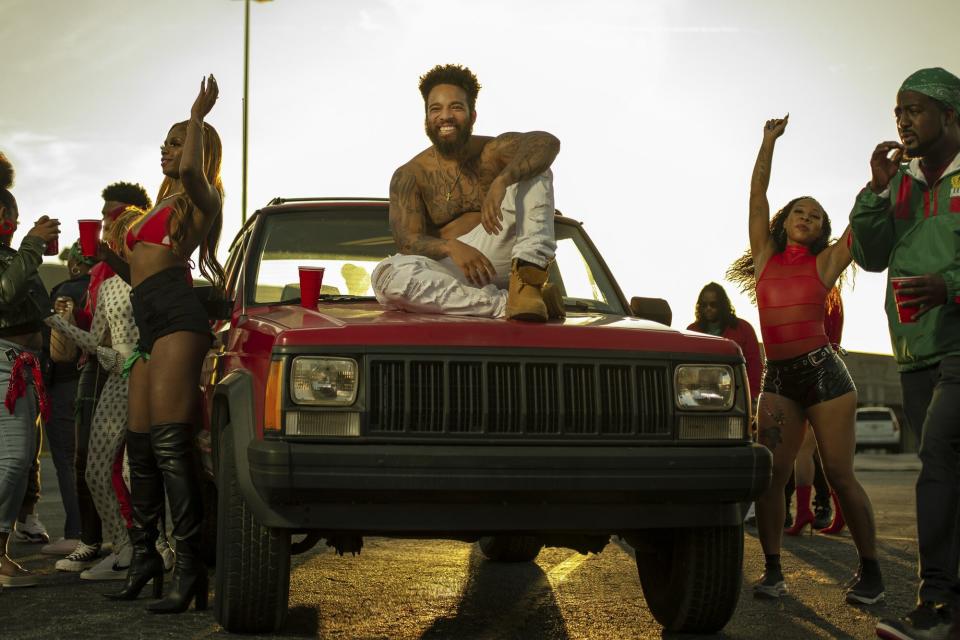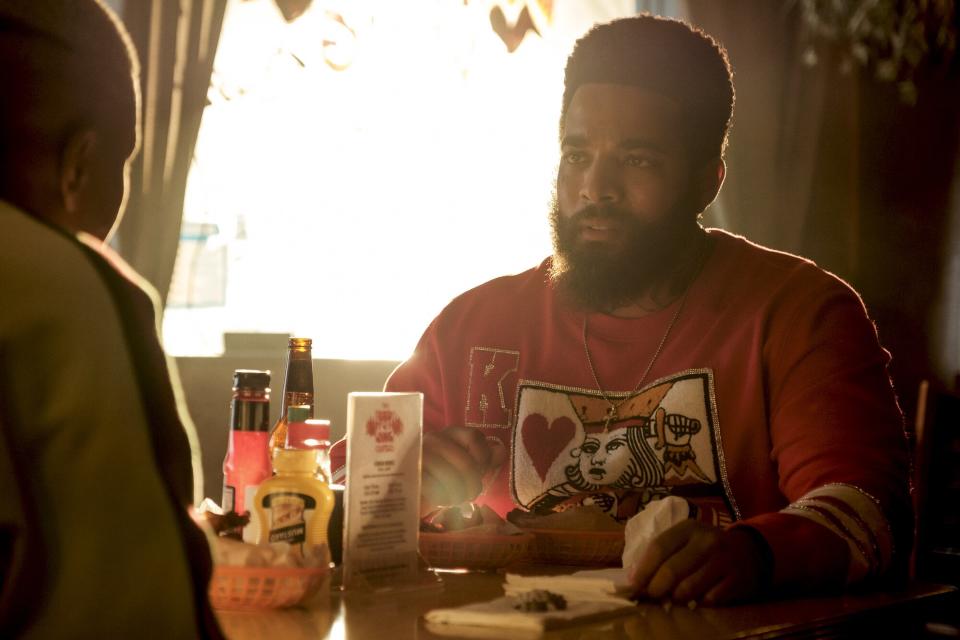John Clarence Stewart on Big Teak's powerful P-Valley journey
- Oops!Something went wrong.Please try again later.
The most recent episode of P-Valley was its most shocking yet.
Big Teak (John Clarence Stewart) and Lil Murda (J. Alphonse Nicholson) were front and center in "Savage." After celebrating the release of his new song with Tina Snow (upcoming guest star Megan Thee Stallion's character), Lil Murda realizes that Big Teak is planning to take his own life. They spend the day together, which includes an unexpected date at a diner where they get honest about what they mean to each other. While Lil Murda's plan is to talk Big Teak out of it, the episode does end with him shooting himself in front of Lil Murda. The shock of the event sends him to Uncle Clifford's door covered in blood.
We spoke to John Clarence Stewart about his time on P-Valley, the Big Teak-Lil Murda relationship, the topics explored with his character, and more.

Kyle Kaplan/Starz John Clarence Stewart as Big Teak on 'P-Valley'
ENTERTAINMENT WEEKLY: What drew you to the role of Big Teak?
JOHN CLARENCE STEWART: I knew Katori Hall's work and I was excited about that already. The scene that made me excited was an extension of the piece from the episode 204 monologue. about Black lives. I've never heard or read a character that was saying something that encapsulated my experience being a Black man living through that time she's writing about. I was more than intrigued, I was enthralled.
Through Big Teak's story, P-Valley gets to explore the nuances of a Black man's struggle with his mental health. What was important to you about telling this story?
Everything was important to me. You get to see all these different shades of his turmoil. His turmoil with love, with society, but really the thing that bubbles to the surface is a Black man who doesn't feel like he belongs anywhere. He doesn't feel like the world is made for him and doesn't feel like the world he's released into is made for him.
I know [the] feeling of navigating depression, anxiety, and darkness in my time living. I know a lot of Black men who have friends who have navigated the same waters. Some have taken their lives, some are still making their way through. It's something that is very much a part of our story in our community. There is this myth of this impenetrable Black man that just creates this casing, this hard exterior where inside there's a lot of pain. Without the tools to process and transmute that pain, it turns a soul in on itself and that darkness can take over.
I've heard and read comments of people wishing that he didn't do it and he could have received what [Lil Murda] was saying, wishing he had therapists. The truth is he didn't have those tools.
What did you think about how Big Teak's story would end? What was your initial reaction?
I knew what I signed on for. Katori told me it was going to be five episodes and be very finite. She told me what her intentions were for the character and my mission was set before day one. I didn't know how it was going to end, but I knew it was going to end.
[Zoey's Extraordinary Playlist] got greenlit for a Christmas movie, so I was going between doing P-Valley and this Christmas movie at the same time. So when I read what was Big Teak's final episode, I was actually in Vancouver in my trailer and I remember breaking down in the trailer. I texted Katori and was like, "Wow, wow, wow." It felt so true.
What was developing the very complex relationship between Lil Murda and Big Teak like for you?
It's an amazing professional relationship. I have the utmost respect for [J. Alphonse Nicholson] as an actor and artist. He has the same respect for me. We joined forces on behalf of these men and everything was about telling their truth.

Kyle Kaplan/Starz J. Alphonse Nicholson as Lil Murda and John Clarence Stewart as Big Teak on 'P-Valley'
I did want to mention the light they bring out in one another. Scenes like the date in the diner. What was shooting that like and showing what they meant to one another?
What you see in those moments is what happens when Black men have a safe space to be vulnerable and intimate, open and soft. These are two men who have hardened in the world. They have sensitive souls. Lil Murda has an artist's soul and spirit ad Teak is a porous and sensitive soul. The world they live in wasn't made for sensitive souls in Black skin. So much of Teak's driving force has to do with not being able to protect himself and not being able to do it on behalf of the people he cares about. When you see them together, I love that you highlight that because the Black love, Black joy, Black intimacy, and Black softness is the story as much as if not more than the pain.
One thing we didn't get to see is Uncle Clifford [Nicco Annan] and Big Teak together. Not in a love triangle way, but they are two very unique people and so different from one another. Did you give any thought to what that encounter would be like?
Absolutely. I didn't know if I would ever meet Cliff. We see glimpses of how Teak would respond to Cliff, in that scene in the wing spot where Murda is communicating who Cliff is to him and Teak is a bit confused. He doesn't quite know what to make of her and yet there is something that I believe Teak would hone in on. It may be painful, but it's the fact that there is another person in the world who cares for Murda the way he does. That would be paramount. I have that about [them meeting]. I wonder if they would chop it up or become friends? Would they have misunderstandings? I think they are similar in the sense that the world was not made for either of them. Cliff has rules for the Pynk that she created. There is an ecosystem that she's created that is in alignment with who she is. One thing I imagined and dreamed up for Teak is a set of internal laws that he lives by and I think that they would connect on that very much.
What will you take with you from your experience on P-Valley in your work moving forward?
My mom sent me an interview I did when I was 25 to read through and it moved me to tears because I spoke about wanting to tell stories for my community and being drawn to characters that have darkness in them to try to understand that place inside them and empathize with them. So much of my career so far enabled me to do that and play Teak.
What I'm taking from this specific experience is that I love working with Black people. I love working on different stories with all kinds of people, but there's something special about telling this Black story and having it be so specific. I believe that when storytelling is very specific it makes it universal. I think Katori has done that.
This interview has been edited and condensed.
P-Valley airs Sundays on Starz.
If you or someone you know is considering suicide, please contact the National Suicide Prevention Lifeline at 1-800-273-TALK (8255), text "STRENGTH" to the Crisis Text Line at 741-741 or go to suicidepreventionlifeline.org.
Related content:

